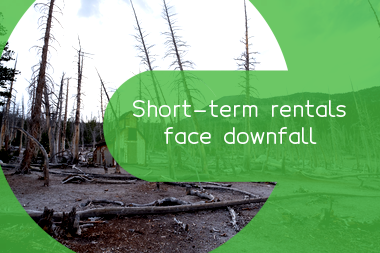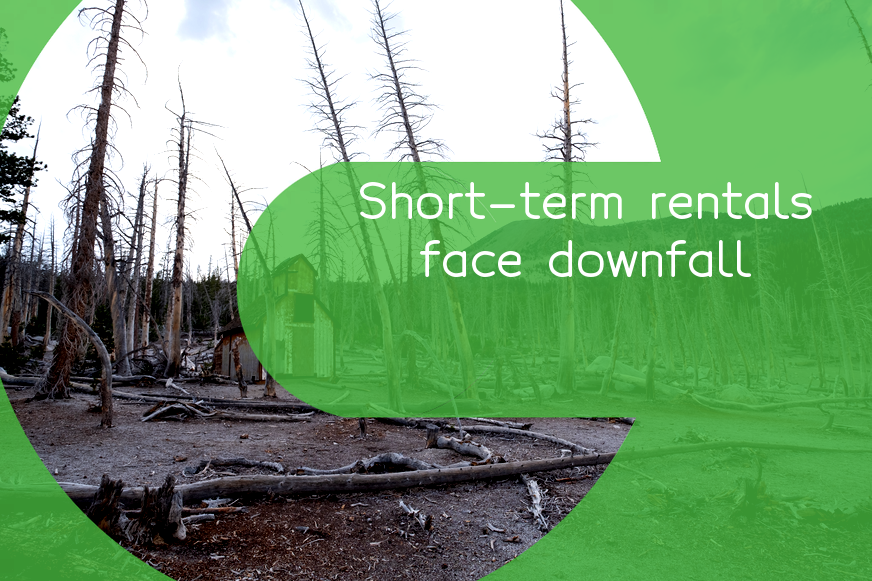The fall of short-term rentals can be attributed to many factors. Here are some of the most significant ones:
- 1. Regulatory Changes: The rise of short-term rentals drew the attention of regulatory authorities who were concerned about how the business model may disrupt traditional residential neighborhoods. Many cities around the world have introduced strict new laws governing short-term rentals, making it harder for hosts to operate within the legal framework.
- 2. Public Backlash: Hosts and guests alike have often run afoul of their communities, evoking the ire of neighbors who complained about loud parties, excessive noise, and other disturbance of the peace. These concerns have ignited a backlash, compelling local governments to respond harshly against the industry.
- 3. The Pandemic: Coronavirus has all but decimated the travel industry, particularly short-term rentals. The lockdowns and travel restrictions put in place worldwide have led to millions of cancellations, leaving hosts with empty properties and struggling to make ends meet.
- 4. Economic Downturn: Since short term rentals target leisure and business travel, there has been a noticeable decline in demand due to the economic downturns experienced globally. Tourists and business travelers are directing their resources elsewhere, leaving the industry in dire straits.
Considering all these factors, the short-term rental industry may have to adapt and evolve, recalibrating its policies and standards to win back community trust, regulatory approval, and traveler confidence before recoveries could happen.
Why the Short-Term Rental Strategy is Losing Steam
There are several reasons why the short-term rental strategy is losing steam:
- 1Increased Regulations: Many cities and local governments have started to regulate the short-term rental market, imposing strict rules and limitations on the number of nights and properties that can be rented. Some cities have even banned or severely restricted short-term rentals in certain areas.
- 2Negative Community Impact: The practice of renting out a property for short periods can have a negative impact on the surrounding community, causing noise and disturbances, overcrowding, and a loss of affordable housing.
- 3Economic Uncertainty: The current economic climate has made it difficult for many people to travel and take vacations. As a result, the demand for short-term rental properties has decreased, and landlords and property owners are struggling to make ends meet.
- 4Health and Safety Concerns: The COVID-19 pandemic has led to increased health and safety concerns among travelers, and many people are choosing to stay in hotels or properties with stringent hygiene protocols rather than short-term rental properties.
- 5Alternative Accommodations: The rise of alternative accommodations such as aparthotels, serviced apartments, and extended stay hotels has given travelers more options when it comes to accommodation, making short-term rentals less attractive.
How Investor Struggles Could Impact the Housing Market
Investor struggles can impact the housing market in several ways:
- 1Reduced investor demand: If investors face financial struggles, they may not have the funds needed to purchase additional properties. This can lead to a decrease in demand for housing, which can ultimately result in a decline in property values.
- 2Lower property prices: If there is a surplus of available properties on the market, caused by investors looking to sell off their assets or simply not being able to afford them, this can lead to a drop in property prices. This can create opportunities for first-time buyers to enter the market, but it may also discourage potential sellers from putting their homes up for sale.
- 3Less rental properties: If investors own rental properties and face financial difficulties, they may be forced to sell off these properties. This can reduce the availability of rental properties, potentially leading to increased rents and less affordable housing for renters.
- 4Changes in construction activity: If investor struggles lead to a decline in new construction or renovations, this can impact the overall supply and demand of properties. This can create a ripple effect through the economy, affecting related industries such as construction, materials suppliers, and contractors.
Overall, investor struggles can have a significant impact on the housing market, potentially leading to changes in property prices, rental availability, and construction activity.
How to stay in the airbnb game.
I can suggest the following tips to stay in the Airbnb game:
- 1. Keep your pricing reasonable: Don't overprice your property as it might lead to fewer bookings. Do proper market research and price your property competitively.
- 2. Keep your property clean and well-maintained: Make sure your property is clean and tidy when guests arrive. Arrange for regular cleaning and maintenance to keep your property in good condition.
- 3. Respond promptly to guests' inquiries and requests: Be responsive and answer all queries and requests from guests. Provide clear and concise information to make their stay comfortable.
- 4. Provide excellent customer service: Go the extra mile to ensure your guests have a pleasant stay. Provide them with information about local attractions, restaurants, and amenities.
- 5. Keep up with the latest trends and technologies: Stay updated with the latest trends in the industry and make use of new technologies to improve your guests' experience.
- 6. Build a positive reputation: A good reputation is essential for running a successful Airbnb business. Encourage your guests to leave positive reviews and ratings.
- 7. Stay flexible and adaptable: Be open to change and willing to adapt to new changes in the industry to keep your Airbnb business thriving.
Just one more thing: if you liked the article, please like us on social media and share this article with friends.



